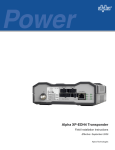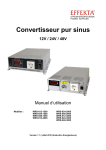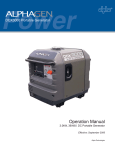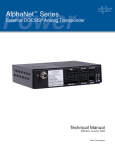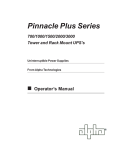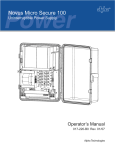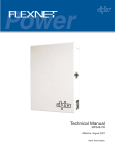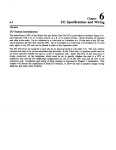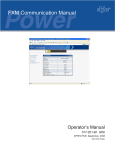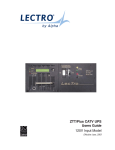Download Alpha Technologies ELPM300-48D Specifications
Transcript
ELPM 300-48D ELPM300-48D, DC UPS Power Supply Installation and Operation Manual Effective: July 2009 Alpha Technologies ® Power Alpha Technologies ® FlexNet ELPM 300-48D Installation and Operation Manual 010-322-C0-003, Rev C. Effective Date: July 2009 Copyright© 2009 Alpha Technologies, Inc. A Member of the Alpha Group NOTE: Photographs contained in this manual are for illustrative purposes only. These photographs may not match your installation. NOTE: Operator is cautioned to review the drawings and illustrations contained in this manual before proceeding. If there are questions regarding the safe operation of this powering system, please contact Alpha Technologies or your nearest Alpha representative. NOTE: Alpha shall not be held liable for any damage or injury involving its enclosures, power supplies, generators, batteries, or other hardware if used or operated in any manner or subject to any condition not consistent with its intended purpose, or is installed or operated in an unapproved manner, or improperly maintained. Contacting Alpha Technologies: www.alpha.com OR For general product information and customer service (7 AM to 5 PM, Pacific Time), call 1-800-863-3930 For complete technical support, call 1-800-863-3364 7 AM to 5 PM, Pacific Time or 24/7 emergency support 010-322-C0-003, Rev C 3 Table of Contents Safety Information.................................................................................................................. 5 1.0 2.0 Installation................................................................................................................. 10 1.1 Introduction..................................................................................................... 10 1.2 FlexNet Installation .........................................................................................11 1.3 Battery and RTS Probe Installation .............................................................. 12 1.4 Output Connections ....................................................................................... 13 1.5 Status Monitoring Connections....................................................................... 13 1.6 Status LEDs ................................................................................................... 15 1.7 AC Input Power Connection........................................................................... 15 1.8 Battery Connection......................................................................................... 15 1.9 Output Distribution Board (optional)............................................................... 16 Specifications............................................................................................................ 17 2.1 ELPM300-48D DC Power Supply................................................................... 17 2.2 Output Distribution Board............................................................................... 19 2.3 FlexNet Installation Kit and Options................................................................ 20 List of Figures Fig. 1-1 Top view, Mounting Bracket Extension Range..............................................11 Fig. 1-2 Front view, ELPM 300-48D...........................................................................11 Fig. 1-3 Battery Layout, RTS placement.................................................................... 12 4 010-322-C0-003, Rev C Safety Information Review the drawings and illustrations contained in this manual before proceeding. If there are any questions regarding the safe installation or operation of the system, contact Alpha Technologies or the nearest Alpha representative. Save this document for future reference. To reduce the risk of injury or death and to ensure the continued safe operation of this product, the following symbols have been placed throughout this manual. Where these symbols appear, use extra care and attention. ATTENTION: ATTENTION! is used for specific regulatory/code requirements that may affect the placement of equipment and /or installation procedures. NOTE: NOTE gives readers additional information to help them complete a specific task or procedure. CAUTION! CAUTION! presents safety information to PREVENT DAMAGE TO customers’ equipment. WARNING! A WARNING presents safety information to PREVENT INJURY OR DEATH to the technician or user. 010-322-C0-003, Rev C 5 General Safety Precautions To avoid injury: • This enclosure and its associated hardware must be serviced only by authorized personnel. • Enclosure must remain locked at all times, except when authorized service personnel are present. • Remove all conductive jewelry or personal equipment prior to servicing equipment, parts, connectors, wiring, or batteries. • Read and follow all installation, equipment grounding, usage, and service instructions included in this manual. • Use proper lifting techniques whenever handling enclosure, equipment, parts, or batteries. • Batteries contain dangerous voltages, currents and corrosive material. Battery installation, maintenance, service and replacement must be performed by authorized personnel only. • Never use uninsulated tools or other conductive materials when installing, maintaining, servicing or replacing batteries. • Use special caution when connecting or adjusting battery cabling. An improperly connected battery cable or an unconnected battery cable can result in arcing, a fire, or possible explosion. • A battery that shows signs of cracking, leaking or swelling must be replaced immediately by authorized personnel using a battery of identical type and rating. • Avoid any contact with gelled or liquid emissions from a valve-regulated lead-acid (VRLA) battery. Emissions contain dilute sulfuric acid which is harmful to the skin and eyes. Emissions are electrolytic, which are electrically conductive and are corrosive. Follow the Chemical Hazards notes if contact occurs. • Do not smoke or introduce sparks in the vicinity of a battery. • Under certain overcharging conditions, lead-acid batteries can vent a mixture of hydrogen gas that is explosive. Proper venting of the enclosure is required. • Follow the battery manufacturer’s approved transportation and storage instructions. CAUTION! Enclosure, equipment or parts may be damaged or cause damage if used or installed improperly. To avoid damage: • Prior to installation, verify that the AC input voltage to the enclosure and its equipment match with respect to voltage and frequency. • Prior to installation, verify that the output voltage from the enclosure or its equipment match the voltage requirements of the connected equipment (load). • Prior to installation, verify that the enclosure’s utility service panel is equipped with a properly rated circuit breaker for use with the equipment inside. Refer to manufacturer’s recommendations. • Review and upgrade utility service panel circuit breaker requirements whenever the equipment within the enclosure is changed. • Prior to installation, contact local utilities, local building maintenance departments, and cable/ piping locator services to ensure that installation does not interfere with existing utility or building cables/piping. • Do not exceed the output rating of equipment. Verify load requirements prior and during connection process. • Prior to handling the batteries, touch a grounded metal object to dissipate any static charge that may have developed in your body. 6 010-322-C0-003, Rev C Battery Safety WARNING! Lead-acid batteries contain dangerous voltages, currents and corrosive material. Battery installation, maintenance, service and replacement must be performed only by authorized personnel. Chemical Hazards Any gelled or liquid emissions from a valve-regulated lead-acid (VRLA) battery contain dilute sulfuric acid, which is harmful to the skin and eyes. Emissions are electrolytic, and are electrically conductive and corrosive. To avoid injury: • Servicing and connection of batteries shall be performed by, or under the direct supervision of, personnel knowledgeable of batteries and the required safety precautions. • Always wear eye protection, rubber gloves, and a protective vest when working near batteries. Remove all metallic objects from hands and neck. • Batteries produce explosive gases. Keep all open flames and sparks away from batteries. • Use tools with insulated handles, do not rest any tools on top of batteries. • Batteries contain or emit chemicals known to the State of California to cause cancer and birth defects or other reproductive harm. Battery post terminals and related accessories contain lead and lead compounds. Wash hands after handling (California Proposition 65). • Wear protective clothing (insulated gloves, eye protection, etc.) whenever installing, maintaining, servicing, or replacing batteries. • If any battery emission contacts the skin, wash immediately and thoroughly with water. Follow your company’s approved chemical exposure procedures. • Neutralize any spilled battery emission with the special solution contained in an approved spill kit or with a solution of one pound Bicarbonate of soda to one gallon of water. Report chemical spill using your company’s spill reporting structure and seek medical attention if necessary. • Always replace batteries with those of an identical type and rating. Never install old or untested batteries. • Do not charge batteries in a sealed container. Each individual battery should have at least 0.5 inches of space between it and all surrounding surfaces to allow for convection cooling. • All battery compartments must have adequate ventilation to prevent an accumulation of potentially dangerous gas. • Prior to handling the batteries, touch a grounded metal object to dissipate any static charge that may have developed on your body. • Never use uninsulated tools or other conductive materials when installing, maintaining, servicing or replacing batteries. • Use special caution when connecting or adjusting battery cabling. An improperly connected battery cable or an unconnected battery cable can make contact with an unintended surface that can result in arcing, fire, or possible explosion. • A battery showing signs of cracking, leaking, or swelling should be replaced immediately by Authorized Personnel using a battery of identical type and rating. 010-322-C0-003, Rev C 7 Battery Maintenance Guidelines The battery maintenance instructions listed below are for reference only. Battery manufacturer’s instructions for transportation, installation, storage or maintenance take precedence over these instructions. • • • • • • • • To prevent damage, inspect batteries every 3 months for: Signs of battery cracking, leaking or swelling. The battery should be replaced immediately by authorized personnel using a battery of the identical type and rating. Signs of battery cable damage. Battery cable should be replaced immediately by Authorized Personnel using replacement parts specified by vendor. Loose battery connection hardware. Refer to battery manufacturer’s documentation for the correct torque and connection hardware for the application. Apply battery manufacturer’s specified antioxidant compound on all exposed connections. Verify battery terminals and/or exposed connection hardware is not within 2 inches of a conductive surface. Reposition batteries as necessary to maintain adequate clearance. Clean up any electrolyte (battery emission) in accordance with all federal, state, and local regulations or codes. Proper venting of the enclosure is recommended. Follow the Battery Manufacturer’s approved transportation and storage instructions. Always replace batteries with those of an identical type and rating. Never install old or untested batteries. Do not charge batteries in a sealed container. Each individual battery should have at least 0.5 inches of space between it and all surrounding surfaces to allow for convection cooling. All battery compartments must have adequate ventilation to prevent an accumulation of potentially dangerous gas. Recycling and Disposal Instructions Spent or damaged batteries are considered environmentally unsafe. Always recycle used batteries or dispose of the batteries in accordance with all federal, state and local regulations. Electrical Safety • • • • • • Lethal voltages are present within the power supply and electrical boxes. Never assume that an electrical connection or conductor is not energized. Check the circuit with a volt meter with respect to the grounded portion of the enclosure (both AC and DC) prior to any installation or removal procedure. Always use the buddy system when working under hazardous conditions. A licensed electrician is required to install permanently wired equipment. Input voltages can range up to 240 VAC. Ensure that utility power is disabled before beginning installation or removal. Ensure no liquids or wet clothes contact internal components. Hazardous electrically live parts inside this unit are energized from batteries even when the AC input power is disconnected. Mechanical Safety 8 • • Keep hands and tools clear of fans. Fans are thermostatically controlled and will turn on automatically. Power supplies can reach extreme temperatures under load. • Use caution around sheet metal components and sharp edges. 010-322-C0-003, Rev C Grounding Connection In order to provide a ready, reliable source of backup power it is necessary to establish a grounding system that not only provides for the safety of the service personnel responsible for its operation and maintenance, but also facilitates the proper operation and protection of the equipment within the network. Such a grounding system will provide protection with respect to operator safety, system communication, and equipment protection. Safety Ground The safety ground is a two-part system. The first part is a return path for stray current back to the input breaker, and the second is a return path from the Alpha enclosure to a second ground rod. Typically, the safety, or utility ground, provides a return path to the input breaker or fuse panel by means of a connection to an appropriate driven ground rod at the base of the power pole. This path must meet National Electric Code (NEC) as well as local codes to ensure the breaker will open, preventing unwanted current flow from posing a hazard to service personnel. The second part of the safety ground arrangement is the ground path between the Alpha enclosure and a second ground rod located at least 6 feet away from the driven ground rod at the power pole. The second ground rod and enclosure are connected via an AWG #6 solid copper wire buried at a depth of 8-12 inches. The wire is connected to the cabinet by means of a ground lug on the back of the cabinet (for pole-mounted enclosures), or to a ground lug inside the cabinet (for ground-mounted enclosures), and connected to the ground rod by means of a listed grounding clamp suitable for direct burial, or exothermic weld. Normally it is specified that the impedance of this ground can be no greater than 25 ohms at 60 Hertz. If, however, dual ground rods are installed approximately eight feet apart, it is not necessary to measure the impedance of the ground rods to meet the maximum 25 ohms specification—it is assumed that the impedance specification is met. Strike (Lightning) Ground Lightning strikes, grid switching, or other aberrations on the power line all have the potential to cause “fast rise-time currents” which can cause damage to the powering system. Without a low-impedance path to ground, the current, while traveling through wires of varying impedance, can produce high voltages which will damage the powering equipment. The most viable method available to protect the system from damage is to divert these unwanted “fast rise-time currents” along a low-impedance path to ground. A low-impedance path to ground will prevent these currents from reaching high voltage levels and posing a threat to equipment. The single-point grounding system provides a low-impedance path to ground, and the key to its success is the proper bonding of the ground rods, so the components of the grounding system appear as a single point of uniform impedance. WARNING! Low impedance grounding is mandatory for personnel safety and critical for the proper operation of the cable system. 010-322-C0-003, Rev C 9 1.0 Installation 1.1 Introduction The FlexNet Fiber UPS model ELPM300-48D is a small-form, outdoor-rated, uninterruptible power supply for distributed communications networks. The unit can be installed in a variety of Alpha enclosures and is powered by 120Vac or 240Vac line input or 48Vdc battery string. The 48Vdc, 300 Watt output provides uninterruptible power for various distributed communications networks. Features and benefits: Power Modules can be used in a variety of Alpha enclosures Rugged 48Vdc UPS for outdoor or indoor applications Temperature compensated battery charging for extended battery life Visual and electrical indicators for on-site and remote reporting Flexible cabinet mounting options Included with the unit are: Mounting Brackets; see Section 1.2. RTS (the Remote Temperature Sensor gets its backup power from a 48VDC battery string); See Section 1.3. Output Cable Kit; see Section 1.4 Alarm Telemetry Connector; Status Monitoring, see Section 1.5. Options include a Battery Heater Mat, Output Distribution Board and Battery Cable Kit. 10 010-322-C0-003, Rev C 1.0 Installation, continued 1.2 FlexNet Installation Use #6 screws and attach mounting brackets to side of unit. Use #10 screws (at least one per side and attach unit on the mounting bar in the upper compartment of the enclosure. 3.40” 2.50” (86.36mm) (63.5mm) 3.30” (83.82mm) 4.00” (101.6mm) Fig. 1-1, Mounting Bracket Extension Range (Top view) 11.06” (281mm) 2.18” (55.3mm) 5.5” (139.7mm) 4.375” (111mm) 5.98” (152mm) 10.10” (257mm) 12.00” (304.8mm) Fig. 1-2, Reference dimensions, ELPM 300-48D (Front view) 010-322-C0-003, Rev C 11 1.0 Installation, continued 1.3 Battery and Remote Temperature Sensor Probe Installation The diagram below is for illustrative purposes only. Exact battery orientation may vary. Do not connect the batteries to the Flexnet 300 unit at this time. The RTS must be taped to the side of a center battery as shown below. Connect the other end to the RJ-11 temperature jack on the front of the power supply. Air Gap Red Black 4A 3A To “Battery” connector 2A Red 1A To “Temperature” connector Fig. 1-3, Battery Layout and RTS Placement 12 010-322-C0-003, Rev C 1.0 Installation, continued 1.4 Output Connector The output connection is located on the front panel of the unit. Plug the 48VDC fiber node into this connector. 1.5 Status Monitoring Connector The Status Monitoring connector is located on the front panel of the unit. Associating with this connector, an opto-coupler transistor array is connected between the output alarm pins (Batt Low, Batt Miss, Repl Batt and AC Fail) and the ground pin (Tel Comm) as shown. In the normal state, all the transistors are turned off and all the alarm pins are separated to the ground. When an alarm is present, the micro controller will turn on the corresponding transistor to short the alarm pin to the ground. 010-322-C0-003, Rev C 13 In order to correctly receive the alarm signals, it is recommended to put a pull-up resistor between the receive circuit’s logic power (3.3V or 5V) and each alarm line at the alarm signal monitor side, as shown below. The resistance may vary per current requirement of the receive circuit. All four alarm lines are LOW at the normal operation. When an alarm is present, the corresponding line will be HIGH. For example: when AC is turned off, the monitor will see a HIGH presence at AC fail line while the remaining three alarm lines—Repl Batt, Batt Low and Miss Batt—remain LOW. Time Delay in Reporting Alarm Customers may see a time delay between failure and alarm reports. An alarm signal is reported only after a failure persists for a certain period of time. This time delay is designed to avoid customers being annoyed by trivial short period failures (for example: short time AC failure). Time Delay for Each Alarm AC fail — The unit reports AC fail after the battery voltage is less than 52.8V and the battery discharges for 17 Amp-mins. Batt Low — The unit reports Batt Low after the battery voltage is less than 44V for 30 seconds. Batt Miss — The unit reports Batt Miss after the battery is disconnected for 30 seconds. It may report Batt Low at the same time. Repl Batt — the unit reports Repl Batt after it diagnoses the battery as bad. However, the unit runs a battery diagnosis once a month; it might take awhile for the system to diagnose battery failure if the failed battery does not also have other problems (such as low battery voltage). 14 010-322-C0-003, Rev C 1.0 Installation, continued 1.6 Status LEDs The status LEDs are located on the front panel of the unit. Normal operation is indicated by the green LED ON, and the red LED OFF. LED status indication also has a time delay when reporting failures. The time delay is similar to that illustrated in Section 1.5. 1.7 AC Input Power Connection The Flexnet 300 offers switchable AC input power capability. Slide the input power switch (located on the side of the housing) to the correct voltage and plug the AC power cord into the receptacle. Verify that the green LED is continuously illuminated and the red LED begins to blink within 20 seconds, indicating that the battery pack is not yet installed. 1.8 Battery Connection Using a multimeter, verify that 48Vdc is present at the connection leading from the battery pack, and the polarity is correct. Connect the battery pack to the Battery connection on the front of the unit. Note the shape of the Battery connectors which prevent incorrect hookup. Verify that the red alarm LED goes out within 10 seconds. 010-322-C0-003, Rev C _ + 15 1.0 Installation, continued 1.9 Output Distribution Board (optional) The Output Distribution Board (Alpha P/N 745-577-20) splits the ELPM300-48D’s 300W output into two 150W isolated outputs. Each output has its independent protection circuit. One output overload or short circuit will only trigger its own protection and not affect the other circuit’s normal operation. The ODB measures 6.25” W x 3.875” H x 2” D (159mm W x 98.4mm H x 51mm D). J3 — 150W Output Output wire harness (Alpha P/N 875-262-20) J1 — Input connector 300 W output from unit Input wire harness (Alpha P/N 875-255-20) J2 — 150W Output Output wire harness (Alpha P/N 875-262-20) NOTE: The Output Distribution board is supplied with one interconnection cable (Alpha P/N 875-255-20), and one output wire harness (Alpha P/N 875-262-20). The existing output wire harness is replaced by the interconnection cable, and is transferred to one of the output connectors. The adapter bracket mounts to the cross bar in the enclosure, which mounts next to the power supply.Attach the Output Distribution Board to the Adapter Bracket by aligning and sliding the hanger brackets onto the bracket screws. 1. Loosen both screws enough to allow the bracket prongs to slide over the screw heads. 2. Firmly tighten only the bottom screw to secure the module. 16 3.75” 95.25mm 010-322-C0-003, Rev C 2.0 Specifications 2.1 ELPM300-48D DC Power Supply Mechanical Housing Sheet metal enclosure Mounting Wall mounting brackets included Rack-mounting via optional 19-inch EIA brackets Material Finish Cooling Aluminum Painted black Natural convection Acoustic Noise, Line Mode 50dBa at 1m (maximum) Acoustic Noise, Batt Mode 50dBa at 1m (maximum) Electrical — AC Input Voltage, Minimum 85/170 factory setting Voltage, Maximum 132/264 selectable via slide switch Frequency Frequency Tolerance 50/60Hz ± 10% Source Impedance <5% FL equivalent impedance Input Current Limit 7A Minimum Power Factor 60% Harmonic Input Current Class A per CE 1000-2-3 (230Vac 50Hz) Maximum Surge Current 50A peak Protection Line Leakage Surge/Transient protection Power Cord Fuse, MOV 2.5mA max at 264Vac 50Hz IEEE Std C62.41-1991 level C 3’ NEMA 515 120VAC plug Electrical Output — 48Vdc Power Capability Voltage Number of Outputs Startup Overshoot Range Frequency Transient Reasponse Ripple Voltage, Maximum Maximum Efficiency Output Grounding Short Circuit Protection 320W, continuous 40 to 62Vdc (For some models, max output voltage is 56Vdc*) 1 120% of nominal, 0.5 sec. max. DC Not to exceed 1s 500mV RMS 85% within normal operating range Floating, SELV Electronic Overload Protection Integral Active Load Sharing None *Models 010-322-22-XXX and 010-322-23-XXX 010-322-C0-003, Rev C 17 2.0 Specifications, continued 2.1 ELPM300-48D DC Power Supply, continued Electrical — Battery Bus Voltage Recharge Time Temperature Compensation Range Temp. Compensation dV/dC End of Discharge Voltage 48Vdc nominal 10X Discharge Rate to 90% state of charge -20°C to +40°C -72mV/°C per string 42Vdc (1.75V/cell) Discharge Current 6A Charge Current 6A Quiescent Current <5mA after end of discharge (EOD) Battery Grounding Float, SELV Electrical — Local Display LED STATUS Green Steady Output OK Green Blinking Standby Operation Both Blinking Fault Red Blinking Batt Low/Missing Red Steady Replace Battery Electrical — Status Monitor Interface Status Monitoring Alarms Battery Low Battery Missing Replace Battery AC Fail Environment Operation Temperature -40°C to 55°C (-40°F to 131°F) Storage Temperature -40°C to 70°C (-40°F to 158°F) Solar Loading Inclusive maximum temperature operation Humidity 0-95%, non-condensing Altitude Temp. spec applicable to 5,000ft (1524m). Above 5,000ft, de-ratemax temp 2°C per additional 1,000ft (304.8m) Physical Dimensions Weight 18 10.10” W x 5.98” H x 3.30” D (257mm W x 152mm H x 84mm D) 4.4lb/2.0kg 010-322-C0-003, Rev C 2.0 Specifications, continued 2.2 Output Distribution Board (optional) Electrical — General Efficiency > 90% Grounding Positive or negative terminal (user preference) Startup Time < 20s Electrical — Input Voltage, minimum 42Vdc Voltage, nominal 48Vdc Voltage, maximum 62Vdc Electrical — Output I/II Voltage, minimum 41 Vdc Voltage, maximum 61Vdc Current, nominal Output Ripple, max. 3A 500mV RMS Overcurrent/Short Circuit Protecting Mode Hiccup Protection Trigger <10ms Threshold 4A Environment Operating Temperature -40°C to +65°C (-40°F to +149°F) Storage Temperature -50°C to +70°C (-58°F to +158°F) Solar Loading Inclusive maximum operating temperature Humidity 0-95%, Non-condensing Altitude Temp. spec applicable to 5,000ft (1524m). Above 5,000ft, de-ratemax temp 2°C per additional 1,000ft (304.8m) 010-322-C0-003, Rev C 19 2.3 FlexNet Installation Kit and Options The following items are part of the FlexNet installation package and options for the ELPM300-48D power supply. NOTE: The optional 10” x 17” Battery Heater Mat (Alpha P/N 189-057-10) is not shown . Battery Cable Kit (Alpha P/N 875-218-21) See Section 1.8 Output Cable Kit (Alpha P/N 875-262-20) See Section 1.4 Mounting Brackets/Hardware (Alpha P/N 604-564-C4) See Section 1.2 (RTS) Remote Temperature Sensor (Alpha P/N 740-162-27) See Section 1.3 Alarm Telemetry Connector (Alpha P/N 545-866-10) 19” EIA Rack Mounting Brackets (Alpha P/N 604-907-A1) 20 010-322-C0-003, Rev C Power Alpha Technologies ® Alpha Technologies 3767 Alpha Way Bellingham, WA 98226 USA Tel: +1(360) 647-2360 Fax: +1(360) 671-4936 Web: www.alpha.com Alpha Technologies Ltd. 4084 McConnell Court Burnaby, BC, V5A 3N7 CANADA Tel: +1(604) 430-1476 Fax: +1(604) 430-8908 Alpha Technologies Europe Ltd. Twyford House Thorley Bishop's Stortford Herfordshire CM22 7PA UNITED KINGDOM Tel: +44 1279-501110 Fax: +44 1279-659870 Alpha Technologies GmbH Hansastrasse 8 D-91126 Schwabach GERMANY Tel: +49-9122-79889-0 Fax: +49-9122-79889-21 Alphatec, Ltd P.O. Box 56468 Limassol, Cyprus CYPRUS Tel: +357-25-375675 Fax: +357-25-359595 Alpha Technologies France 34, Grande Rue Bétheny, F-51450 France Phone: +33 32 64990 54 Fax: +33 95 60205 01 Due to continuing product improvements, Alpha reserves the right to change specifications without notice. Copyright © 2009 Alpha Technologies, Inc. All rights reserved. Alpha is a registered trademark of Alpha Technologies. 010-322-C0-003 Rev. C

























